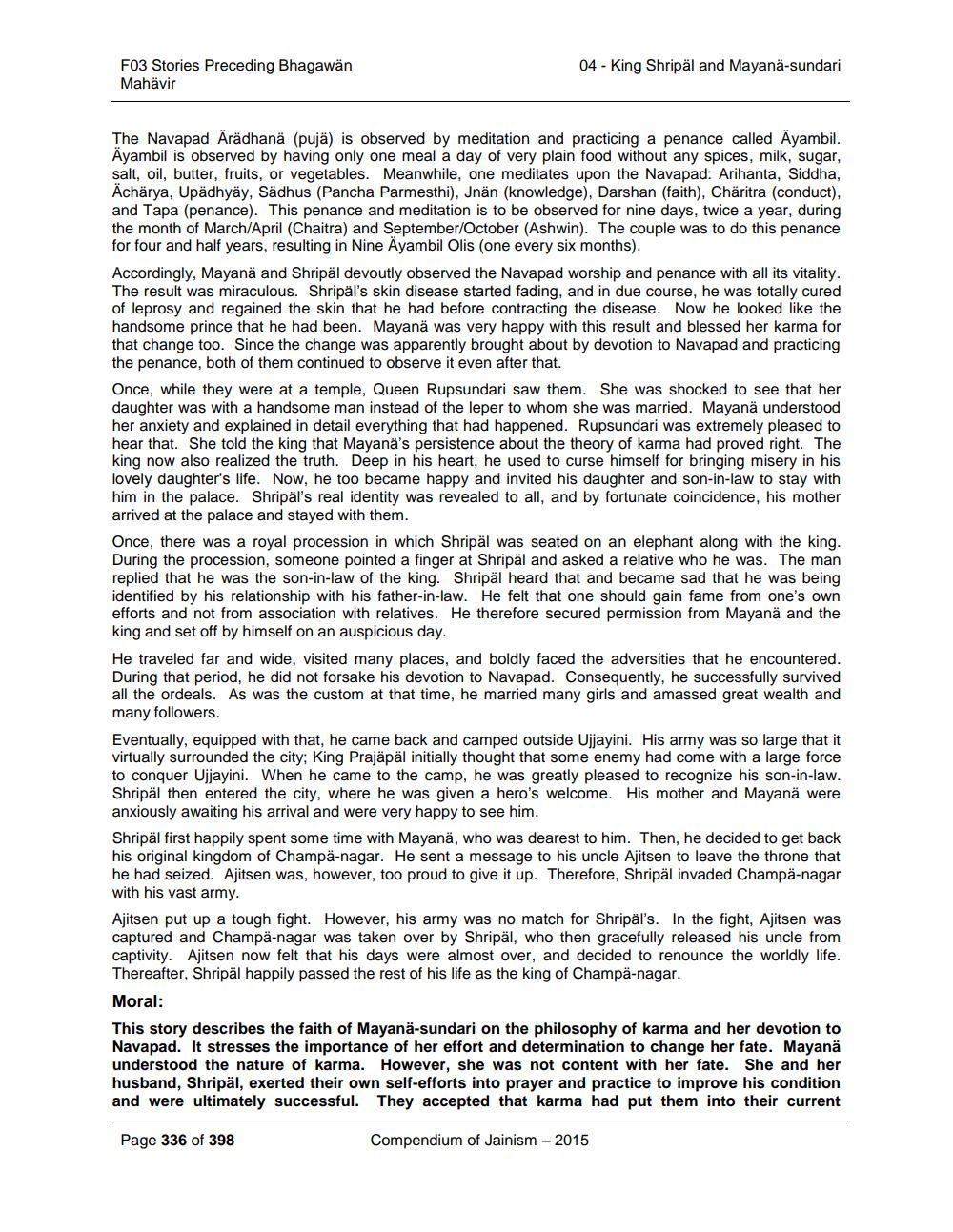________________
F03 Stories Preceding Bhagawan Mahävir
04 - King Shripäl and Mayana-sundari
The Navapad Ärädhanä (puja) is observed by meditation and practicing a penance called Ayambil. Ayambil is observed by having only one meal a day of very plain food without any spices, milk, sugar, salt, oil, butter, fruits, or vegetables. Meanwhile, one meditates upon the Navapad: Arihanta, Siddha, Acharya, Upadhyay, Sädhus (Pancha Parmesthi), Jnän (knowledge), Darshan (faith), Chäritra (conduct), and Tapa (penance). This penance and meditation is to be observed for nine days, twice a year, during the month of March/April (Chaitra) and September/October (Ashwin). The couple was to do this penance for four and half years, resulting in Nine Ayambil Olis (one every six months). Accordingly, Mayana and Shripäl devoutly observed the Navapad worship and penance with all its vitality. The result was miraculous. Shripal's skin disease started fading, and in due course, he was totally cured of leprosy and regained the skin that he had before contracting the disease. Now he looked like the handsome prince that he had been. Mayana was very happy with this result and blessed her karma for that change too. Since the change was apparently brought about by devotion to Navapad and practicing the penance, both of them continued to observe it even after that. Once, while they were at a temple, Queen Rupsundari saw them. She was shocked to see that her daughter was with a handsome man instead of the leper to whom she was married. Mayanä understood her anxiety and explained in detail everything that had happened. Rupsundari was extremely pleased to hear that. She told the king that Mayana's persistence about the theory of karma had proved right. The king now also realized the truth. Deep in his heart, he used to curse himself for bringing misery in his lovely daughter's life. Now, he too became happy and invited his daughter and son-in-law to stay with him in the palace. Shripal's real identity was revealed to all, and by fortunate coincidence, his mother arrived at the palace and stayed with them. Once, there was a royal procession in which Shripäl was seated on an elephant along with the king. During the procession, someone pointed a finger at Shripäl and asked a relative who he was. The man replied that he was the son-in-law of the king. Shripäl heard that and became sad that he was being identified by his relationship with his father-in-law. He felt that one should gain fame from one's own efforts and not from association with relatives. He therefore secured permission from Mayana and the king and set off by himself on an auspicious day. He traveled far and wide, visited many places, and boldly faced the adversities that he encountered. During that period, he did not forsake his devotion to Navapad. Consequently, he successfully survived all the ordeals. As was the custom at that time, he married many girls and amassed great wealth and many followers. Eventually, equipped with that, he came back and camped outside Ujjayini. His army was so large that it virtually surrounded the city; King Prajäpäl initially thought that some enemy had come with a large force to conquer Ujjayini. When he came to the camp, he was greatly pleased to recognize his son-in-law. Shripäl then entered the city, where he was given a hero's welcome. His mother and Mayanä were anxiously awaiting his arrival and were very happy to see him. Shripäl first happily spent some time with Mayanä, who was dearest to him. Then, he decided to get back his original kingdom of Champa-nagar. He sent a message to his uncle Ajitsen to leave the throne that he had seized. Ajitsen was, however, too proud to give it up. Therefore, Shripäl invaded Champä-nagar with his vast army. Ajitsen put up a tough fight. However, his army was no match for Shripal's. In the fight, Ajitsen was captured and Champa-nagar was taken over by Shripäl, who then gracefully released his uncle from captivity. Ajitsen now felt that his days were almost over, and decided to renounce the worldly life. Thereafter, Shripäl happily passed the rest of his life as the king of Champä-nagar. Moral: This story describes the faith of Mayanä-sundari on the philosophy of karma and her devotion to Navapad. It stresses the importance of her effort and determination to change her fate. Mayanä understood the nature of karma. However, she was not content with her fate. She and her husband, Shripäl, exerted their own self-efforts into prayer and practice to improve his condition and were ultimately successful. They accepted that karma had put them into their current
Page 336 of 398
Compendium of Jainism - 2015




